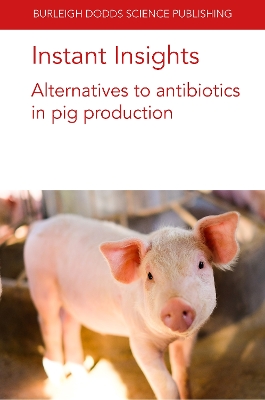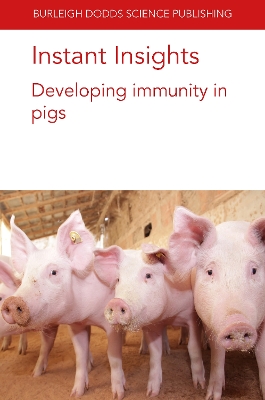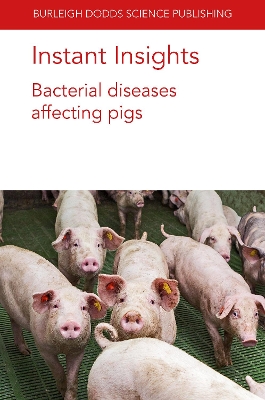Burleigh Dodds Science: Instant Insights
3 primary works
Book 32
Instant Insights: Alternatives to Antibiotics in Pig Production
by Dr Paul Ebner, Dr Yingying Hong, Prof Glen Almond, Sara D. Hough, Dr Barbara U. Metzler-Zebeli, Ingunn Stensland, and John R Pluske
Published 18 October 2022
This collection features four peer-reviewed reviews on alternatives to antibiotics in pig production.
The first chapter provides a brief overview of antibiotic use in pig production and addresses the consequent development of antibiotic resistance. The chapter reviews recent advances in developing non-antibiotic means of controlling bacterial infections in swine, such as the use of phage therapy.
The second chapter considers the use of prebiotics to optimise gut function in pigs. The chapter summarises current knowledge on the effects of prebiotic oligosaccharides on porcine gut function and health, as well as the modes of action of the commonly used prebiotics in pig production.
The third chapter reviews advances in nutritional strategies to boost immune function in pigs, including the use of lipopolysaccharide to stimulate the immune system. The chapter considers the need to reduce the use of antimicrobials in swine diets and reviews the effect of dietary supplementation during key stages of a pig’s life to enhance immunity.
The final chapter reviews the microbiota of the gastrointestinal tract of the young pig and the important role it plays in the early stages of life. The chapter considers the use of probiotics and prebiotics in the post-weaning period of piglets to optimise gut function, animal health and performance.
The first chapter provides a brief overview of antibiotic use in pig production and addresses the consequent development of antibiotic resistance. The chapter reviews recent advances in developing non-antibiotic means of controlling bacterial infections in swine, such as the use of phage therapy.
The second chapter considers the use of prebiotics to optimise gut function in pigs. The chapter summarises current knowledge on the effects of prebiotic oligosaccharides on porcine gut function and health, as well as the modes of action of the commonly used prebiotics in pig production.
The third chapter reviews advances in nutritional strategies to boost immune function in pigs, including the use of lipopolysaccharide to stimulate the immune system. The chapter considers the need to reduce the use of antimicrobials in swine diets and reviews the effect of dietary supplementation during key stages of a pig’s life to enhance immunity.
The final chapter reviews the microbiota of the gastrointestinal tract of the young pig and the important role it plays in the early stages of life. The chapter considers the use of probiotics and prebiotics in the post-weaning period of piglets to optimise gut function, animal health and performance.
Book 58
Instant Insights: Developing Immunity in Pigs
by Prof Bert Devriendt, Prof. Mick Bailey, Emily Porter, Ore Francis, Prof Glen Almond, Sara D. Hough, Dr P. Bosi, Dr D. Luise, and Dr P. Trevisi
Published 19 July 2022
This collection features four peer-reviewed literature reviews on developing immunity in pigs.
The first chapter provides an overview of the latest research in gut function and immunity in pigs, as well as the role of the gut microbiota in shaping intestinal immune responses. The chapter also reviews recent advances in the development of novel tools to investigate the function of the pig gut.
The second chapter describes the enteric and mucosal immune systems of pigs and presents evidence from experimental studies of the links between the immune system and microbiota. It examines the microbiome and metabolism of pigs and highlights its importance in the development of pig immune systems.
The third chapter reviews advances in nutritional strategies to boost immune function in pigs, including the use of lipopolysaccharide to stimulate the immune system. The chapter considers the need to reduce the use of antimicrobials in swine diets and reviews the effect of dietary supplementation during key stages of a pig’s life to enhance immunity.
The final chapter assesses methods of improving gut function in pigs to optimise health, prevent pathogen colonization and optimise immunity. The chapter discusses research on genes associated with pathogen resistance and porcine immune response and reviews the role of dietary and nutritional strategies in preventing intestinal pathogen colonisation.
The first chapter provides an overview of the latest research in gut function and immunity in pigs, as well as the role of the gut microbiota in shaping intestinal immune responses. The chapter also reviews recent advances in the development of novel tools to investigate the function of the pig gut.
The second chapter describes the enteric and mucosal immune systems of pigs and presents evidence from experimental studies of the links between the immune system and microbiota. It examines the microbiome and metabolism of pigs and highlights its importance in the development of pig immune systems.
The third chapter reviews advances in nutritional strategies to boost immune function in pigs, including the use of lipopolysaccharide to stimulate the immune system. The chapter considers the need to reduce the use of antimicrobials in swine diets and reviews the effect of dietary supplementation during key stages of a pig’s life to enhance immunity.
The final chapter assesses methods of improving gut function in pigs to optimise health, prevent pathogen colonization and optimise immunity. The chapter discusses research on genes associated with pathogen resistance and porcine immune response and reviews the role of dietary and nutritional strategies in preventing intestinal pathogen colonisation.
Book 59
This collection features four peer-reviewed literature reviews on bacterial diseases affecting pigs.
The first chapter summarises recent research on the causes and epidemiology of major bacteria, viruses and parasites found in pig production, focussing on those with a particular impact on safety and global production, such as Escherichia coli (E. coli), Salmonella typhimurium and African swine fever virus.
The second chapter discusses classical phenotypic characteristics and more advanced molecular techniques to identify and classify bacterial pathogens affecting swine health and performance. The chapter explores the different modes of transmission, as well as the commonly used measures for prevention and control, including vaccinations.
The third chapter reviews the development of dysbiosis and post-weaning diarrhoea (PWD) in piglets and the consequent economic losses these diseases cause for the global pig industry. The chapter considers the role of animal nutrition and dietary strategies to optimise gut function as a means of preventing dysbiosis and PWD.
The final chapter assesses methods of improving gut function in pigs to optimise health and prevent pathogen colonization. The chapter discusses research on genes associated with pathogen resistance and porcine immune response and reviews the role of dietary and nutritional strategies in preventing intestinal pathogen colonisation.
The first chapter summarises recent research on the causes and epidemiology of major bacteria, viruses and parasites found in pig production, focussing on those with a particular impact on safety and global production, such as Escherichia coli (E. coli), Salmonella typhimurium and African swine fever virus.
The second chapter discusses classical phenotypic characteristics and more advanced molecular techniques to identify and classify bacterial pathogens affecting swine health and performance. The chapter explores the different modes of transmission, as well as the commonly used measures for prevention and control, including vaccinations.
The third chapter reviews the development of dysbiosis and post-weaning diarrhoea (PWD) in piglets and the consequent economic losses these diseases cause for the global pig industry. The chapter considers the role of animal nutrition and dietary strategies to optimise gut function as a means of preventing dysbiosis and PWD.
The final chapter assesses methods of improving gut function in pigs to optimise health and prevent pathogen colonization. The chapter discusses research on genes associated with pathogen resistance and porcine immune response and reviews the role of dietary and nutritional strategies in preventing intestinal pathogen colonisation.


